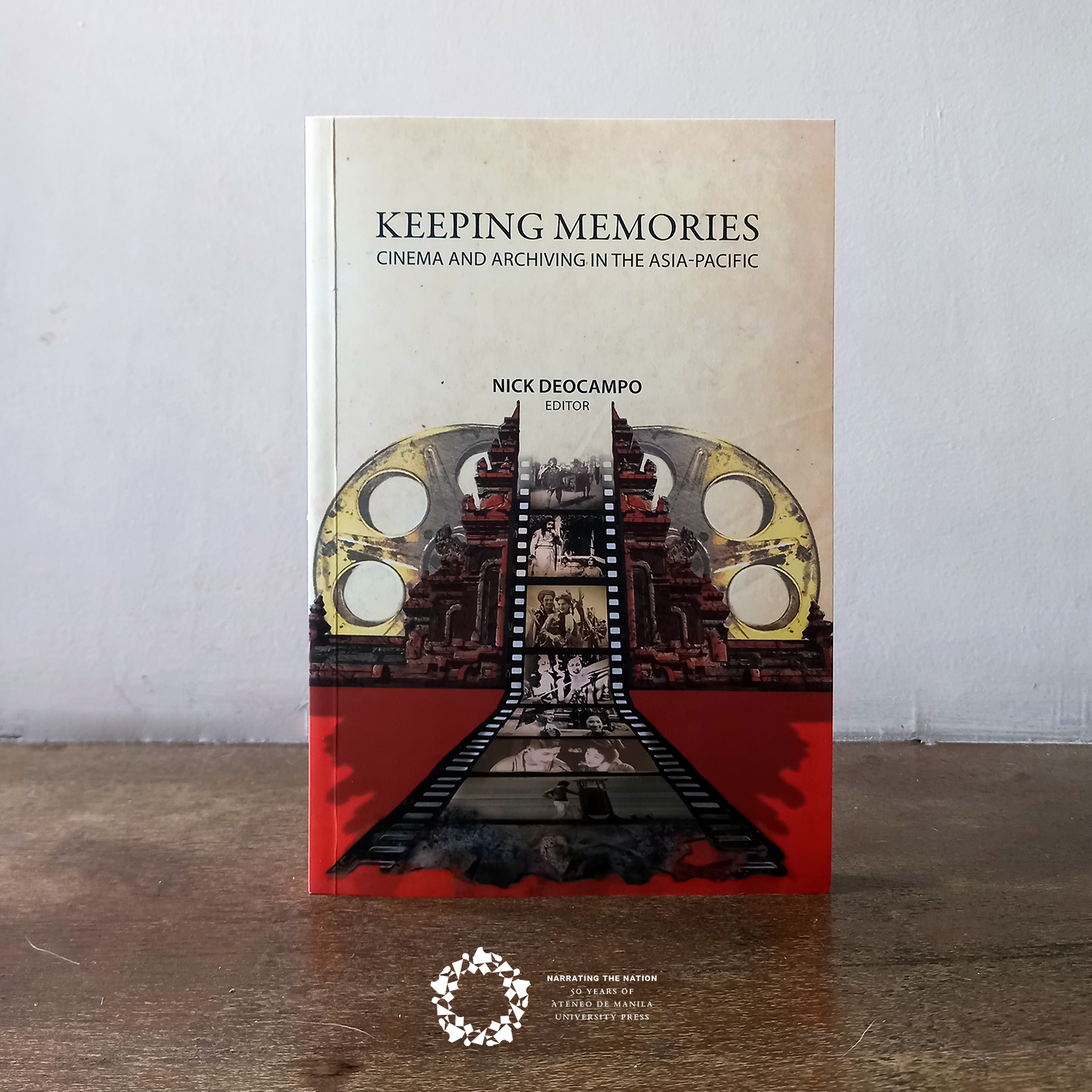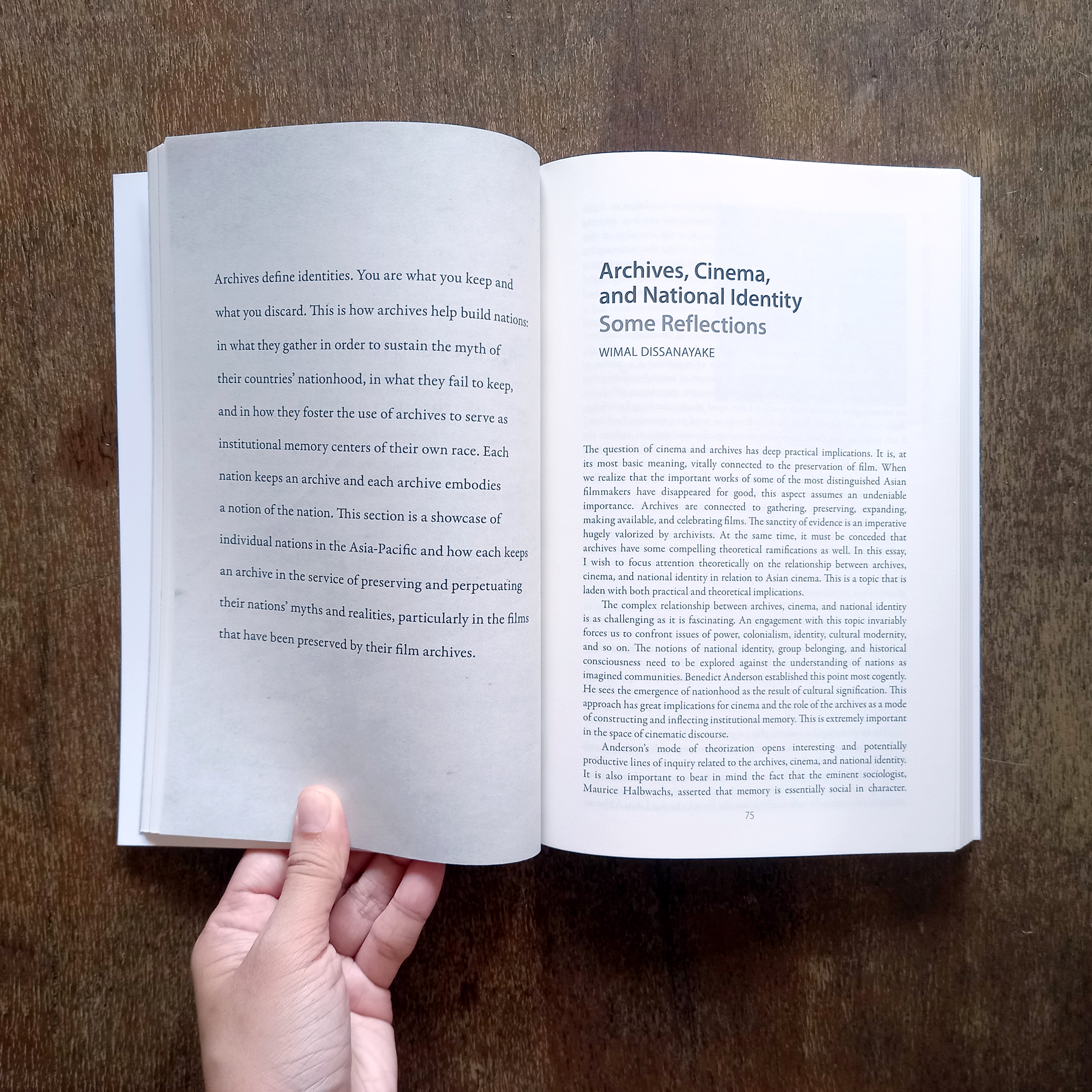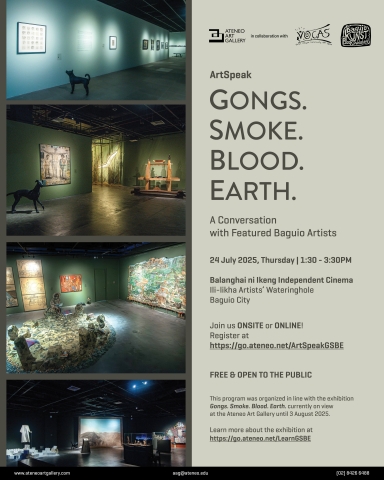[New from the Press] Keeping Memories: Cinema and Archiving in the Asia-Pacific
14 Jul 2022 | Ateneo University Press
Keeping Memories: Cinema and Archiving in the Asia-Pacific edited by Nick Deocampo brings together film scholars, archivists, film artists, academics, media practitioners, historians, and cultural advocates to share their thoughts that touch the heart of our Asian film heritage. In four themes, the sections in this anthology deal with topics such as Archives and Memory, Archives and National Identity, Archives and the Asia-Pacific, and Archives and Cinema History.
The anthology covers topics as varied as personal meanderings in the region and archival encounters, lacunae in film deposits, archival ambiguities, cinematic imaginaries of nation, pandemic media, digital archive, and “lost” film histories.

“[The book] is for the archivists of the future,” Deocampo writes, “as it is for future filmmakers and historians, scholars, and ordinary movie viewers to harness the use of technology to preserve film medium that has a history rich with memories and filled with legacies from the past.” Hot off the press, Keeping Memories reveals a robust concern for both the cinemas in the region and how they are preserved for the future.

This book is co-published by the Ateneo de Manila University Press, Film Development Council of the Philippines (FDCP), Southeast Asia-Pacific Audiovisual Archive Association (SEAPAVAA), and Vietnam Film Institute (VFI).
Get your copy
Website: bit.ly/KM-web
Shopee: bit.ly/KM-s
Lazada: bit.ly/KM-lzd
About the Editor
NICK DEOCAMPO is a filmmaker and film historian. An associate professor at the UP Film Institute in the University of the Philippines, he took up his masters of arts degree in Cinema Studies at New York University as a Fulbright scholar and received his Certificate in Film in Paris, France. An advocate of film archiving, he has written books and articles on the subject, such as Lost Films of Asia, Films from a “Lost” Cinema, Historiography of a “Lost” Cinema, and Envisioning a Rhizomatic Audio-Visual Archiving for the Future. He is a four-time recipient of the Philippine National Book Award, and his publications cover subjects from film history to film literacy. He was formerly chair of the UNESCO Philippines Memory of the World Committee.
About the Contributors
STEPHEN BOTTOMORE spent two decades directing documentaries worldwide while pursuing a parallel career as a film historian. He has been an associate editor of the journal Film History and is the author of two books and many articles on early cinema. He lives in the United Kingdom and Thailand.
KAREN CHAN is the executive director of the Asian Film Archive (AFA) and the president of SEAPAVAA (2020–2023). In the AFA, she is focused on the development and access of film collections, increasing film literacy, and advocating for preservation. Under her leadership, the AFA is establishing a reputation for its innovative programming, and for creating a new life for films through its restoration and facilitation efforts. Throughout the global pandemic since 2020, she has ensured that the AFA innovated through commissions to collaborations, continuing to support filmmakers, and interdisciplinary creatives, and provided avenues for dialogues and learning. Karen teaches film literacy and film preservation classes to students and the public. She publishes and presents at industry and academic events such as the EYE Film Museum Amsterdam, the Association of Moving Image Archivists (AMIA), and the International Film Industry Conference. She also serves on the Singapore Film Commission advisory committee. Karen was the 2019 winner of the Singapore Women’s Weekly Most Inspiring Woman Award and Arts and Media nominee. Her previous work experiences include the National Archives of Singapore, the National Arts Council, and the Natural History Museum in New York City.
BEDE CHENG started his media career in radio production and later worked on a variety of posts in film and television productions as assistant director, line producer, script supervisor, and camera crew member. He first worked at the Hong Kong International Film Festival in 1998 as a festival assistant, then moved to work at the Programming Section of the then newly founded Hong Kong Film Archive from 2000 to 2006. He rejoined the HKIFF Society at the end of 2006 as program and editorial coordinator and has been program manager of the festival since October 2007, dealing with various aspects of film programming and the festival’s administrative matters. Bede was instrumental in setting up the inaugural edition of the Sundance Film Festival–Hong Kong in 2014. He is the managing director of the film restoration laboratory L’Immagine Ritrovata Asia, part-time lecturer at the Hong Kong Baptist University, advisory board member of the Chicago Asian Pop-up Cinema, and former board member of the Hong Kong International Documentary Film Festival.
WIMAL DISSANAYAKE is among the prominent scholars of Asian cinema. For a long time, he was associated with the East-West Center, Hawaii, as head of its Film Program. He also worked for the Hawaii International Film Festival in charge of the film symposium. He is a published author of a large number of books on cinema and cultural theory printed by Indiana, Cambridge, Duke, Oxford, Routledge, and Penguin. Among his notable publications are Melodrama and Asian Cinema and Colonialism and Nationalism in Asian Cinema as editor. He was a recipient of Fulbright and Rockefeller Fellowships. He currently serves as an Honorary Professor at the University of Hong Kong. He has served as an advisor to UNESCO.
SHIVENDRA SINGH DUNGARPUR is an award-winning filmmaker, producer, and film archivist and restorer. He is the founder of Film Heritage Foundation, a not-for-profit organization dedicated to the preservation of India’s cinematic heritage. Shivendra was elected to the executive committee of the International Federation of Film Archives in 2017. Under the banner of Dungarpur Films, he has directed and produced close to 800 commercials. He made his first feature documentary Celluloid Man in 2012, which won two National Awards and traveled to over fifty festivals around the world. His second documentary, The Immortals (2015), premiered at the Busan International Film Festival and won the Special Jury Award for the Best Film at MIFF 2016. His third documentary, CzechMate–In Search of Jiri Menzel is a seven-hour epic that is an in-depth exploration of the Czechoslovakian New Wave.
AARON GEROW is Alfred W. Griswold Professor of East Asian Languages and Literatures and Film and Media Studies at Yale University. His books include Visions of Japanese Modernity: Articulations of Cinema, Nation, and Spectatorship, 1895–1925 (2010); Research Guide to Japanese Film Studies (co-authored with Markus Nornes, 2009 [Japanese version 2016]); A Page of Madness: Cinema and Modernity in 1920s Japan (2008); and Kitano Takeshi (2007). His co-edited anthology Rediscovering Classical Japanese Film Theory—An Anthology (in Japanese) appeared in 2018.
DAVID HANAN is the author of Cultural Specificity in Indonesian Film: Diversity in Unity (Palgrave Macmillan, 2017) and Moments in Indonesian Film History: Film and Popular Culture in a Developing Society 1950–2020 (Palgrave Macmillan, 2021). As well, he has provided subtitles for more than a dozen Indonesian films, and has distributed Indonesian films internationally on DVD from the Monash Asia Institute. In the early 2000s, at the request of SEAPAVAA, he edited the book Film in South East Asia: Views from the Region (Vietnam Film Institute and National Film and Sound Archive of Australia, 2001), in which local authors outlined the history of film in each of ten South East Asia-Pacific countries. Currently, he is updating that book, working with the Thai Film Archive as publisher. He is an Honorary Senior Fellow in the Asia Institute at the University of Melbourne.
JOSHUA HARRIS serves as Media Preservation Coordinator in the Preservation Services Department of the University Libraries, University of Illinois, USA. He received degrees in Anthropology/Archaeology and History from Miami University, Ohio, in 1998 and has over 20 years of experience working in the preservation and conservation of museums, archives, and cultural heritage materials. He worked as an archaeologist for the Illinois State Museum and the University of Tennessee before joining the Zoology Department of the Smithsonian Institution Museum of Natural History. He joined the National Geographic Society Film and Television Archives in 2003, where he supervised collection management, preservation, and the use of archival audiovisual materials in broadcast television, film production, and digital media platforms. Since his appointment at the University of Illinois in 2011, Josh has developed and led the university’s first formalized media and audiovisual preservation program, designing in-house studios and labs for audiovisual conservation, audio, and video preservation. He is heavily involved in the teaching and training of university students and professionals in media preservation skills, techniques, management, and administration. Joshua has been involved in audiovisual preservation in both Southeast Asia and the Pacific for over fifteen years and currently is serving his second term as Treasurer on the Executive Council of Southeast Asia–Pacific Audiovisual Archive Association (SEAPAVAA).
DINA IORDANOVA is an emerita professor in Global Cinema at the University of St Andrews in Scotland. Her work in film studies was initially focused on Eastern Europe, where she comes from. Asian cinema became an interest later in life. She has been a visiting research professor at the University of Hong Kong, has given talks at universities and festivals across Asia, and has served on festival juries at Busan and Yamagata. She has published books on Balkan and East European cinema, as well as on film festivals, transnational film cultures, film circulation, and reception—often with a focus on Asia, e.g, Film Festivals and East Asia (2011) and Digital Disruption: Cinema Moves Online (2013).
BLISS CUA LIM is a professor of Film and Media Studies and Visual Studies at the University of California, Irvine. She is the author of Translating Time: Cinema, the Fantastic, and Temporal Critique (Duke University Press, 2009; Philippine edition, Ateneo de Manila University Press, 2011). She is a member of the editorial collective of the journal Camera Obscura: Feminism, Culture, and Media Studies, published by Duke University Press and serves on the advisory board of Plaridel: A Philippine Journal of Communication, Media and Society and Pelikula: A Journal of Philippine Cinema published by the University of the Philippines, College of Mass Communication, and the UP Film Institute, respectively. Her forthcoming book, The Archival Afterlives of Philippine Cinema (Duke University Press), analyzes the histories of state, private, and informal archival efforts as well as the tenacious audiovisual archival advocacy that arose in response to various archival crises.
GINA MARCHETTI teaches courses in film, gender and sexuality, critical theory, and cultural studies at the University of Hong Kong. She is the author of Romance and the “Yellow Peril”: Race, Sex, and Discursive Strategies in Hollywood Fiction (University of California, 1993), From Tian’anmen to Times Square: Transnational China and the Chinese Diaspora on Global Screens (Philadelphia: Temple University Press, 2006), The Chinese Diaspora on American Screens: Race, Sex, and Cinema (Philadelphia: Temple University Press, 2012), Andrew Lau and Alan Mak’s Infernal Affairs—The Trilogy (Hong Kong University Press, 2007), and Citing China: Politics, Postmodernism, and World Cinema (Hawai‘i, 2018).
CHARLES MUSSER is a professor of Film and Media Studies, American Studies, and Theater and Performance Studies at Yale University. His books include the award-winning The Emergence of Cinema: The American Screen to 1907 (1990) and Politicking and Emergent Media: US Presidential Elections of the 1890s (2016). He produced and directed such documentaries as Before the Nickelodeon: The Early Cinema of Edwin S. Porter (1982), which premiered at the New York Film Festival, and Our Family Album (2019), which premiered at the Quezon City International Film Festival. He received the Distinguished Career Achievement Award from the Society for Cinema and Media Studies in 2020.
MICK NEWNHAM has worked in audiovisual preservation for over thirty years. During this time, he has contributed to the work of SEAPAVAA, serving in several roles, most recently as the president, as well as the Association of Moving Image Archivists, International Federation of Film Archives, and taken part in the work of the International Organization for Standardization (ISO). Mick regularly provides training and consultancies across the globe on audiovisual collection management and preservation, and is a Visiting Fellow at the University of Melbourne (Australia). In 2017 Mick was awarded a Lifetime Achievement Award by the Film Heritage Foundation (India) for his work, and in 2018 Mick was made a SEAPAVAA Fellow in recognition of his dedication to the development of audiovisual archiving in Southeast Asia and the Pacific Region.
BENEDICT SALAZAR OLGADO is an assistant professor at the University of the Philippines School of Library and Information Studies, teaching archival theory and practice. Bono’s research is broadly situated at the intersections of memory, technology, and documentation studies. He received his MA in Moving Image Archiving and Preservation from New York University and a BA in Social Sciences from the Ateneo de Manila University. An audiovisual archivist, Bono has worked in various media archives, including as founding director of the National Film Archives of the Philippines. He is presently pursuing a Ph.D. in Informatics at the University of California, Irvine.
NGUYEN MINH PHUONG is head of the Cataloguing Department at the Vietnam Film Institute. Among the books, she published as the author are: Movie Director Dang Nhat Minh: Life, Career and Works, Film Directors of Vietnam, vol. II, and Joris Ivens and the People’s War in Vietnam. She has also written articles that have been published in national magazines.
JOIE SPRINGER is currently a consultant providing advice on a range of documentary heritage issues from over thirty years of experience working in an international setting. She, therefore, has an overview of the common issues that affect audiovisual (AV) archiving in different countries, especially those in developing countries. She was responsible for planning and implementing global activities for fostering and/or supporting national development through AV archives. She conducts and facilitates workshops on the assessment of the significance of documentary heritage for nomination to UNESCO Memory of the World Registers. She is a conference speaker, as well as an author of articles and papers, on general documentary heritage matters.
AKIRA TOCHIGI graduated from the Graduate School of Arts and Science at New York University. He was long engaged in a range of works in film communities such as the assistant to the director of the Film Department at New York’s Japan Society and editor in chief of the monthly film journal Image Forum. In 2003 Tochigi joined the National Film Center of the National Museum of Modern Art, Tokyo (now National Film Archive of Japan) as Curator of Film and was responsible for acquisition, preservation, and restoration of motion picture films and access to the film collection. The restoration projects he was involved in include Akira Kurosawa’s Rashomon (1950) and Teinosuke Kinugawa’s Jigokumon (Gate of Hell, 1953). Since his retirement from National Film Center as chief curator in March 2018, Tochigi has continued to work as an independent film archivist and president of the Japan Association of Moving Image Archivists (JAMIA), founded in May 2020.
NADI TOFIGHIAN is a research fellow and lecturer at the Department of Media Studies, Stockholm University. Special issues editor for Early Popular Visual Culture. Member of the board for the Swedish Film Institute.
Get your copy
Website: bit.ly/KM-web
Shopee: bit.ly/KM-s
Lazada: bit.ly/KM-lzd





